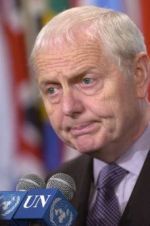Britain, US plan to submit new draft on Darfur to UN vote
Aug 29, 2006 (UNITED NATIONS) — Diplomats said a revised US-British draft resolution would be circulated in the UN Security Council, authorizing the deployment of UN peacekeepers in Sudan’s strife-torn Darfur region.
 Britain and the United States stressed their determination to push for a vote on the text by Thursday, even though Khartoum has made it abundantly clear that it does not want a UN force in its troubled western region.
Britain and the United States stressed their determination to push for a vote on the text by Thursday, even though Khartoum has made it abundantly clear that it does not want a UN force in its troubled western region.
Last week, the two Western countries put forward a draft that calls for a 17,000-strong UN force to take over from the ill-equipped and under-funded African Union (AU) mission, which has been unable to prevent killings, rape and the internal displacement of civilians in Darfur.
“It is my intention to circulate with my American colleague in support this afternoon a revised text, amended slightly to take account of the discussions we have had,” Britain’s UN envoy Emyr Jones Parry told reporters Tuesday.
He said he had asked Ghana’s UN Ambassador Nana Effah-Apenteng, the council president for August, to schedule consultations on the text Wednesday before moving to a vote “as soon as possible.”
“Depending on the council’s reaction, we will decide what further action should be taken on the resolution,” the Ghanaian envoy said.
“We are still going to try to have that vote by Thursday. I think that’s feasible to do,” US Ambassador John Bolton said. “The discussions continue, but we think we are pretty close.”
“We think we found a formulation that will win acceptance on the council and achieve the objectives we are seeking, which is the early transfer of responsibility in Darfur to the United Nations,” he added.
But the main sticking point is how to win the consent of the Sudanese government.
Jones Parry said the revised draft would address the issue of Sudanese consent.
Bolton said nobody expected the UN force to have to fight its way into Darfur, but the deployment of UN peacekeepers is seen as crucial to the success of a fragile Darfur peace agreement signed by the Khartoum government and the main rebel faction last May.
But in Khartoum, Sudanese President Omar al-Beshir again rebuffed a plea from Washington’s top Africa envoy Tuesday to allow a UN force into strife-torn Darfur, after forcing her to extend her visit to secure a meeting at all.
The one concession Beshir did make to Jendayi Frazer, the US assistant secretary of state for African affairs, was an undertaking to consider the case of a Pulitzer Prize-winning US journalist detained in the western region “from a humanitarian point of view”.
Frazer had brought with her an invitation from US President George W. Bush to meet him on the sidelines of the UN General Assembly in New York next month, Beshir’s spokesman Majoub Fadl Badri said after the talks.
“The president reiterated the Sudanese government’s position rejecting the replacement of the African Union force with a UN one,” Badri said.
“Everybody knows the American-British plotting against the Sudan,” Beshir told a crowd.
“We are not advocates of confrontation with the world, but we shall never accept the transition of the AU mandate to any organisation, and we shall never agree to the AU troops changing their hats from (AU) green to (UN) blue.”
Monday, the Security Council debated the deteriorating situation in Darfur, with UN relief aid coordinator Jan Egeland giving his “bleakest account of conditions (there) since the spring of 2004.”
“Our entire humanitarian operation in Darfur — the only lifeline for more than three million people — is presently at risk,” he told the council.
“We need immediate action on the political front to avoid a humanitarian catastrophe with massive loss of life,” he added. “If the humanitarian operation were to collapse, we could see hundreds of thousands of deaths.”
The council also discussed Beshir’s alternative plan to deploy 10,500 Sudanese government troops by early January to provide security in Darfur.
Washington accuses Sudanese government troops and their proxy Janjaweed militia of genocide over their fierce repression of the uprising launched by ethnic minority rebels in February 2003.
And Beshir, in turn, charges that Washington and other Western powers are furthering imperialist plans in Darfur, and the recent Israeli offensive in Lebanon only appeared to consolidate his opposition to a UN deployment.
(ST/AFP)
